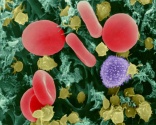Home › magazine › latest news › New research highlights need to abandon modern hygiene hypothesis
New research highlights need to abandon modern hygiene hypothesis
17th of August 2016The July issue of Perspectives in Public Health (published by the Royal Society of Public Health) takes an objective view of ongoing research showing the hygiene hypothesis - the idea that allergies are the price we are paying for our "modern obsession with cleanliness" - is a misleading misnomer.
Not only does it undermine attitudes to hygiene at a time when antibiotic resistance threatens our ability to treat infections, it says, it also hinders the search for ways to reverse the recent dramatic rise in allergies and other chronic inflammatory diseases.
These conclusions and the underlying data are set out in this issue, in a review which summarises the consensus findings of six experts who presented at a joint conference organised by the Royal Society for Public Health and the International Scientific Forum on Home Hygiene in February 2016, together with articles from other contributors.
Whilst the primary function of our immune system is to protect us from infection, equally the system must tolerate non-harmful agents, which we also constantly encounter in our daily lives, many of which may be helpful to our health.
For the development of immune tolerance, it is believed that the immune system requires exposure to certain microbes and even intestinal worms (collectively referred to as 'Old Friends') that evolved together with humans during primate evolution in hunter gatherer times when the immune system was evolving.
Failure to develop the right ‘type' of immune tolerance may lead to inappropriate responses to otherwise harmless agents such as pollen and foods, etc, causing allergic reactions; it can also attack our own body tissues causing diseases such as multiple sclerosis and type 1 diabetes.
The Old Friends mechanism was proposed by Graham Rook in 2003 as an alternative to the hygiene hypothesis, proposed in 1989 by David Strachan. Professor Rook, one of the review authors, states that "although Strachan's idea about the importance of human:microbe interactions was essentially correct, the original hygiene hypothesis that the vital exposures were infections such as colds, influenza, measles and similar childhood illnesses is unlikely. Common childhood infections are not believed to have existed in early human populations when our immune system was evolving".
Although the Old Friends are still there, our bodies are less exposed to them due to a range of changes which have occurred over the last 200 years. These include sanitation and clean water supplies (which have cut us off from Old Friends as well as harmful microbes), changes in lifestyle, rapid urbanisation, altered diet and excessive antibiotic use, all of which have had profound effects on the human microbiome (the millions of microbes which live on or in our bodies), leading to failure of immunotolerance and increased risk of allergic and other inflammatory diseases.
Review author Professor Sally Bloomfield says: "There is no good evidence that hygiene, as the public understands it, is responsible for the loss of vital microbial exposures. If our day-to-day hygiene and cleanliness habits contribute, their role is likely to be small relative to other factors.
"Modern homes, however clean they appear, are 'teeming with microbes' which come from the people and domestic animals living there, the food they eat, together with input from the local outdoor environment - and circulate constantly via hands, surfaces, etc.
"It is quite probable that the microbial (and intestinal worm) content of modern urban homes has altered, but not because of home and personal cleanliness, but because, prior to the 1800s, people lived in predominantly rural surroundings and had different diets and no antibiotics. As a result, we now interact with a very different and less diverse mix of microbes".










